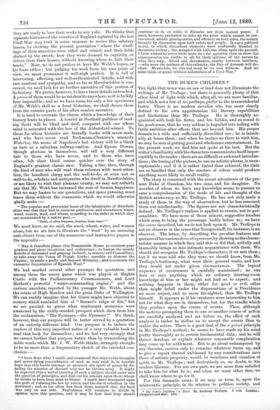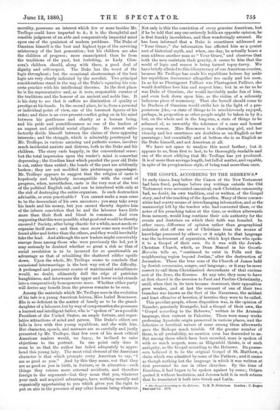THE DUKE'S CHILDREN.*
THE light that never was on sea or land does not illuminate the writings of Mr. Trollope; but there is generally plenty of that other kind of light with which, aftet all, we are more familiar, and which not a few of us, perhaps, prefer to the transcendental lustre. There is no modern novelist who has more clearly defined to his own apprehension his literary capabilities and limitations than Mr. Trollope. He is thoroughly ac- quainted with both his fortes and his foibles, and so sound is his good-sense, that he very seldom is beguiled into toiling with futile ambition after effects that are beyond him. His proper domain is a wide and sufficiently diversified one; he is inimit- ably at home there ; and when he invites us there to visit him, we may be sure of getting good and wholesome entertainment. In the present work, we find him not quite at his best. But the writer's familiarity with his characters communicates itself imper- ceptibly to the reader; there are no difficult or awkward introduc- tions; the toning of the picture, to use an artistic phrase, is unex- ceptionable; and if it is rather tinted than coloured, the tints are so handled that only the masters of colour could prance anything more likely to recall reality.
The story is concerned with the recent adventures of the pre- sent Duke of Omninm, his two sons, and his daughter. No novelist of whom we have any knowledge seems to possess so sane a comprehension of the mode of life and thought of the British aristocracy as Mr. Trollope. He has not only made a. study of them in the way of observation, but he has reasoned them out intellectually. The figures are not characteristically defined ; Mr. Trollope's realism is applied to events, not to per- sonalities. We have none of those minute, suggestive touches which seem to bring the personage bodily before us ; we have the scene described, but we do not look upon it. Mr. Trollops is not an observer in the sense that Toarguenieff, for instance, is an observer. The latter, by describing the peculiar features and gestures of his various dramatis peroonce, by showing us the charac- teristic manner in which they said this or did that, artfully and. insensibly brings us into intimate acquaintance with them. We should not recognise Mr. Trollope's characters, if we met them ; but if we were told who they were, we should know, from Mr. Trollope's testimony, what were their general traits, and how they would act under given circumstances. The logical sequence of occurrences is carefully maintained ; no one does or says anything which an ordinary drawing-room knowledge of him or her might not lead us to expect ; and nothing happens to them, either for good or evil, other than might befall under the dispensations of a Providence no more unjust, and no more far-sighted, than Mr. Trollope himself. It appears as if his creatures were interesting to him not for what they are in themselves, but for the results which they produce upon the course of events. Thus, although the motives prompting them to one or another course of action are carefully analysed and set before us, the effect of such analysis is rather to incline us to accept the events than to realise the actors. There is a good deal of the a priori principle in Mr. Trollope's method ; he seems to have made up his mind pretty thoroughly as to certain fundamental data ; and he will thence develope or explain whatever reasonable complication may come up for settlement. But to go about unhampered by any theories, curious only to examine whatever turns up, and to give a report thereof unbiassed by any considerations save those of artistic propriety, would be weariness and vexation of spirit to Mr. Trollope ; and derivatively so, no doubt, to his readers likewise. For our own part, we are more than satisfied to take him for what he is; and when we want other fare, we shall know where to go for it.
For this dramatic essay, if we may so term it, upon the aristocratic principle, in its relation to politics, society, and.
• The Duke's Childeee: a Novel. By Anthony Trollops. 3 vols. London Chapman and Hall. 1860. morality, possesses an interest which few or none besides Mr. Trollope could have imparted to it; it is the thoughtful and sensible judgment of an able and comparatively impartial mind upon one of the quaintest of modern problems. The Duke of Omnium himself is the best and highest type of the surviving aristocracy of the last generation; but his children are also the children of progress ; more emancipated than he from the traditions of the past, but forfeiting, as Lady Glen- corn's children should, along with these, a good deal of dignity and self-respect. The Duke has the worst of the logic throughout; but the occasional shortcomings of the best logic are very clearly indicated by the novelist. Two principal considerations stand in the way of the Duke's squaring his con- crete practice with his intellectual theories. In the first place, he is the representative and, as it were, responsible curator of the traditions and the honour of an ancient and noble line. It is his duty to see that it suffers no diminution of quality or prestige at his hands. In the second place, he is, from a personal or individual point of view, one of the foremost figures of his order; and there is an ever-present conflict going on in his mind between his gentleness and charity as a human being, and his pride and punctiliousness as one of the leaders of an august and artificial social oligarchy. He cannot satis- factorily divide himself between the claims of these opposing interests; and the struggle, which is admirably pourtrayed by Mr. Trollope, in various amusing and pathetic scenes, involves much incidental anxiety and distress, both to the Duke and his children. The story ends happily, in the conventional sense ; but the total impression upon the reader's mind is somewhat depressing ; the Gordian knot which puzzled the poor old Duke is cat, rather than untied ; the bonds of the past are arbitrarily broken ; they are not modified into picturesque appendages. Mr. Trollope appears to suggest that the religion of caste is hopelessly and helplessly incompatible with the creed of progress, when, nevertheless, caste is the very root of the tree of the political English oak, and can be interfered with only at the risk of destroying the entire organism. Is such destruction advisable, or even practicable ? You cannot make a man cease to be the descendant of his own ancestors; yonenay take away his lands and his money, but you cannot thereby deprive him of the inborn conviction that he and the labourer have little more than their flesh and blood in common. And even supposing thatthis were possible, what good end would be thereby ensured? Society, after being chaotic for a while, must needs re- organise itself anew ; and then once more some men would be found abler and better than the others, and they would inevitably take the lead. And although the new leaders might conceivably emerge from among those who were previously the led, yet it may seriously be doubted whether so great a risk as that of social revolution is to be incurred for so questionable an advantage as that of rebuilding the shattered edifice upside down. Upon the whole, Mr. Trollope seems to conclude that occasional intermarriage is the best way out of the difficulty. A prolonged and persistent course of matrimonial mesallianc,es would, no doubt, ultimately dull the edge of patrician haughtiness, and interweave the upper and lower social strands into a comparatively homogeneous mass. Whether either party will derive any benefit from the process remains to be seen.
Among the materials which Mr. Trollope uses in the evolution of his tale is a young American heiress, Miss Isabel Boncassen. She is so deficient in the matter of family as to be the grand- daughter of a labourer, but by way of compensation she possesses a learned and intelligent father, who is "spoken of" as a possible President of the United States; an ample fortune, and super- lative attractions of mind and person. The Duke's eldest son falls in love with this young republican, and she with him. Her character, speech, and manners are so carefully and justly presented by Mr. Trollope, that few even of his most critical American readers would, we fancy, be inclined to raise objections to the portrait. In one point only does it seem to us that the author has failed adequately to appre- hend this young lady. The most vital element of the American character is that which prompts every American to say, "I am as good as you." And by this they mean, not that they are as good as you in birth, in fortune, or in education—such things they esteem mere external accidents, and therefore foreign to the argument—but they mean that you, whatever your rank and acquired advantages, have nothing morally and organically appertaining to you which gives you the right to put on airs in the presence of any other human being whatever.
Not only is this the conviction of every genuine American, but if he be told that any one seriously holds an opposite opinion, he is first frankly incredulous, and then wonderingly amused. He has been informed that a Duke is sometimes addressed as "Your Grace ;" the information has affected him as a quaint sort of historical myth, and when, one day, he actually hears a man address another man as "Your Grace," and observes that both the men maintain their gravity, it seems to him that the world of logic and reason is being turned topsy-turvy. We have briefly alluded to this idiosyncrasy of our American cousins, because Mr. Trollope has made his republican heiress lay aside her republican irreverence altogether too easily and too soon.. In as far as Plantagenet Palliser was Plantagenet Palliser, she would doubtless love him and respect him ; but in so far as he was Duke of Omnium, she would inevitably make fun of him, and even look down upon him, as the victim of a solemnly ludicrous piece of mummery. That she herself should come to be Duchess of Omnium would strike her in the light of a pre- posterous joke,—a state of things to be mischievously enjoyed, perhaps, in proportion as other people might be taken in by it ; but, on the whole and in the long-run, a state of things to be ashamed of, as unworthy the tolerance of a sane and honest young woman. Miss Boncassen is a charming girl, and her vivacity and her smartness are doubtless as un-English as her parentage ; but essentially and at bottom she is as English as. the Duke himself, and not American at all.
We have not space to analyse this novel farther ; but it appears to us, from first to last, to be thoroughly readable and one of the most edifying that Mr. Trollope has yet produced.. It is of more than average length, but full of matter, and capable, in spite of its perspicacious style, of being read more than once.



































 Previous page
Previous page